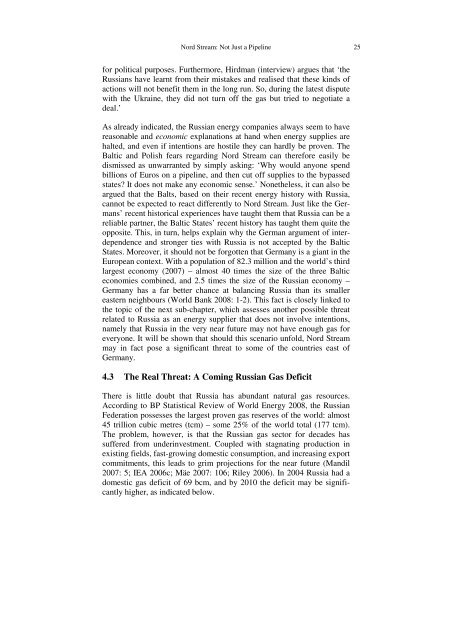Nord Stream: Not Just a Pipeline
Nord Stream: Not Just a Pipeline
Nord Stream: Not Just a Pipeline
Create successful ePaper yourself
Turn your PDF publications into a flip-book with our unique Google optimized e-Paper software.
<strong>Nord</strong> <strong>Stream</strong>: <strong>Not</strong> <strong>Just</strong> a <strong>Pipeline</strong> 25<br />
for political purposes. Furthermore, Hirdman (interview) argues that ‘the<br />
Russians have learnt from their mistakes and realised that these kinds of<br />
actions will not benefit them in the long run. So, during the latest dispute<br />
with the Ukraine, they did not turn off the gas but tried to negotiate a<br />
deal.’<br />
As already indicated, the Russian energy companies always seem to have<br />
reasonable and economic explanations at hand when energy supplies are<br />
halted, and even if intentions are hostile they can hardly be proven. The<br />
Baltic and Polish fears regarding <strong>Nord</strong> <strong>Stream</strong> can therefore easily be<br />
dismissed as unwarranted by simply asking: ‘Why would anyone spend<br />
billions of Euros on a pipeline, and then cut off supplies to the bypassed<br />
states? It does not make any economic sense.’ Nonetheless, it can also be<br />
argued that the Balts, based on their recent energy history with Russia,<br />
cannot be expected to react differently to <strong>Nord</strong> <strong>Stream</strong>. <strong>Just</strong> like the Germans’<br />
recent historical experiences have taught them that Russia can be a<br />
reliable partner, the Baltic States’ recent history has taught them quite the<br />
opposite. This, in turn, helps explain why the German argument of interdependence<br />
and stronger ties with Russia is not accepted by the Baltic<br />
States. Moreover, it should not be forgotten that Germany is a giant in the<br />
European context. With a population of 82.3 million and the world’s third<br />
largest economy (2007) – almost 40 times the size of the three Baltic<br />
economies combined, and 2.5 times the size of the Russian economy –<br />
Germany has a far better chance at balancing Russia than its smaller<br />
eastern neighbours (World Bank 2008: 1-2). This fact is closely linked to<br />
the topic of the next sub-chapter, which assesses another possible threat<br />
related to Russia as an energy supplier that does not involve intentions,<br />
namely that Russia in the very near future may not have enough gas for<br />
everyone. It will be shown that should this scenario unfold, <strong>Nord</strong> <strong>Stream</strong><br />
may in fact pose a significant threat to some of the countries east of<br />
Germany.<br />
4.3 The Real Threat: A Coming Russian Gas Deficit<br />
There is little doubt that Russia has abundant natural gas resources.<br />
According to BP Statistical Review of World Energy 2008, the Russian<br />
Federation possesses the largest proven gas reserves of the world: almost<br />
45 trillion cubic metres (tcm) – some 25% of the world total (177 tcm).<br />
The problem, however, is that the Russian gas sector for decades has<br />
suffered from underinvestment. Coupled with stagnating production in<br />
existing fields, fast-growing domestic consumption, and increasing export<br />
commitments, this leads to grim projections for the near future (Mandil<br />
2007: 5; IEA 2006c; Mäe 2007: 106; Riley 2006). In 2004 Russia had a<br />
domestic gas deficit of 69 bcm, and by 2010 the deficit may be significantly<br />
higher, as indicated below.













